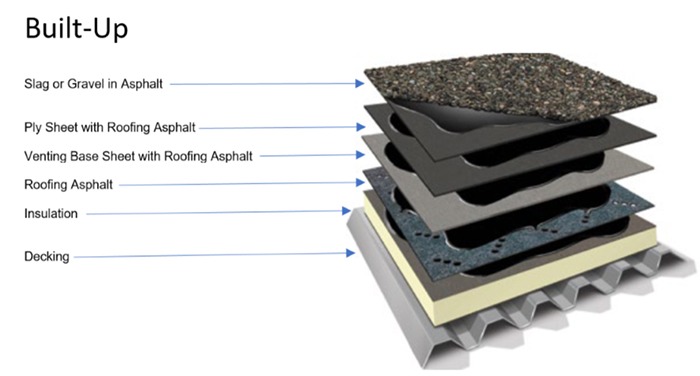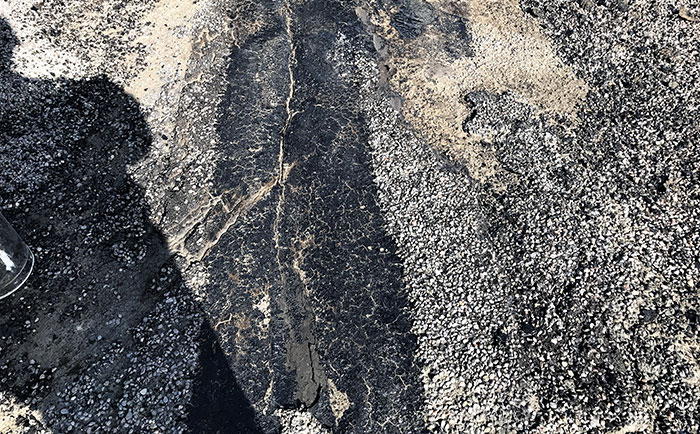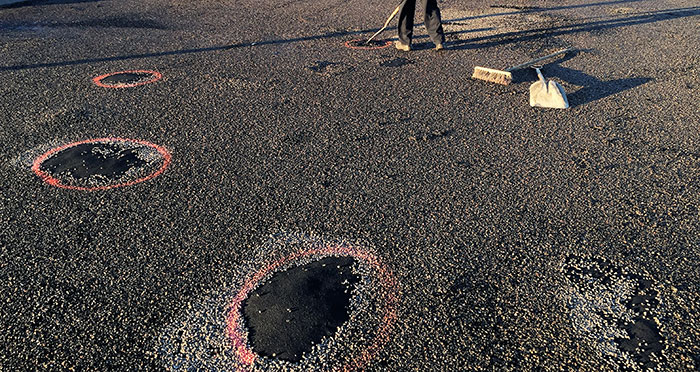Built-up roofing, also called BUR, is a common roofing material used on low-slope commercial roofs. It is composed of alternating layers of reinforcing fabric, asphalt and is finished with a top layer of aggregate, such as gravel.
Built-up roofing gained popularity during the 1970s. More commonly known as tar and gravel roofs, this material consists of alternating layers of bitumen and reinforcing fabrics. Together, these create a finished membrane. The bitumen used includes asphalt or cold-applied adhesive. As for the reinforcing membrane, manufacturers make both organic or fiberglass mats. For surfacing, manufacturers specify different types of materials: aggregates, fiberglass or mineral surfaced cap sheets, hot asphalt, aluminum coatings, or elastomeric coatings.

WHY USE BUILT UP ROOFING?
The main thing that attracts roofers and building owners to built-up roofing systems is that BUR roofs, installed correctly are headache free. You know you are getting a very reliable and durable roof which could last for 20 plus years if properly maintained. In addition, the maintenance and life cycle cost will be low.
The application of Built-Up Roofing systems is detailed work, but the professional who pays particular attention to those details such as curbs, walls, flashings and other projections that interrupt the membrane, will achieve a quality, efficient, long-lasting roof for the commercial building owner.
While other, newer roofing systems certainly have plenty of advantages, many commercial building owners still choose to go with the tried and tested option of a BUR roof.
PROS OF BUR OR BUILT-UP ROOFING
- Good waterproofing properties
- Easy and economical to maintain
- Very good fire-retardant properties
- Longer-lasting (due to multiple plies)
- Provides an excellent finished surface
- Stands up well against inclement weather
- Excellent protection against ultra-violet rays
- Durable surface for foot traffic
- Easy to maintain, easy to identify issues early
CONS OF BUR OR BUILT-UP ROOFING
- A slower installation process
- Can be more expensive to install
- Fumes during the install
- Requires a large set-up area during construction
MOST COMMON PROBLEMS WITH BUR ROOFS
Alligatoring
A series of small cracks can develop in the roof’s surface as the result of shrinkage of the asphalt material. As the problem develops, it looks like dried mud or alligator skin. Left uncorrected, the cracks will grow into splits in the membrane. If inspectors catch the problem early enough, recoating the affected area can slow its spread.

Blisters
These soft bubbles form in the roof’s membrane due to moisture trapped underneath. They can be the size of a dime up to several feet across. They are most noticeable on hot days and can be easily broken by foot traffic. To correct blisters, workers need to identify and eliminate the source of the water. Then they can remove and patch the blistered area.

Ridges
They result from two main causes — thermal expansion of the roofing material and separation of the underlying insulation from the roof deck. The stress in the ridge eventually becomes sufficient to tear the roofing materials. Workers can repair ridges by removing and replacing the damaged insulation and roofing materials.

BUILT-UP ROOF MAINTENANCE
A built-up roof like any other system is exposed to the elements which will result in changes to its physical properties over time. The aging process is a function of temperature changes, UV radiation from the sun, wind, rain, chemicals, vibrations from equipment and many other factors. Your roof is the MOST important part of the building envelope, it needs to be routinely inspected and maintained to ensure an optimal performance and service life. The economic benefits of a proper, proactive roof maintenance program are clear.
Using a reputable Toronto flat roofing company can significantly help with the design and install process and help eliminate future problems. Contact SMC Group Roofing Services for more information at 905-218-3507

